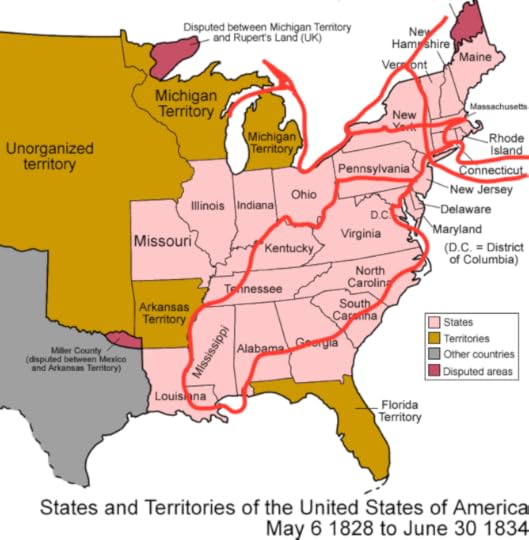Classics and the Western Canon discussion
Democracy in America
>
DIA, Author, Background, and Context
date newest »
newest »
 newest »
newest »
 I will start things off by posting a timeline of the Author's life, some highlights of his trip to America, and a little bit of American history that may have influenced the book. Tocqueville's trip to America is in bold. Note: This is a very long post so it has been hidden between spoiler tags to make it a little easier to get around, but still keep all of the information.(view spoiler)
I will start things off by posting a timeline of the Author's life, some highlights of his trip to America, and a little bit of American history that may have influenced the book. Tocqueville's trip to America is in bold. Note: This is a very long post so it has been hidden between spoiler tags to make it a little easier to get around, but still keep all of the information.(view spoiler)
 Without trying to sound too naive, do we have any idea about who the author's intended audience might have been? His own countrymen?
Without trying to sound too naive, do we have any idea about who the author's intended audience might have been? His own countrymen?
 Mark wrote: "Without trying to sound too naive, do we have any idea about who the author's intended audience might have been? His own countrymen?"
Mark wrote: "Without trying to sound too naive, do we have any idea about who the author's intended audience might have been? His own countrymen?"For Tocqueville, Democracy was the writing on the wall coming soon to a monarchy or aristocracy near you, in particular, France.
Democracy in America was, for Tocqueville, not so much a dispassionate
examination of a foreign land or a travel narrative as an attempt to define the essential characteristics of democracy and to guide France as it developed democratic institutions and customs in a setting and with a history far different from America’s. Hence, in his book, Tocqueville distinguishes between those elements of American society that are essential to a successful democracy and those that were the results of America’s unique history and geography. The result was not only a book that was useful in France and other European nations, but one that is an important analytical tool for Americans to use, even in the 21st century, in order to understand America’s past.
Cook, William R. The Great Courses: Tocqueville and the American Experiment Course Guidebook, Chatilly, Virginia, 2004
 Cool! Thank you, David. I was thinking along those lines. It will be interesting to see how this supposition plays out.
Cool! Thank you, David. I was thinking along those lines. It will be interesting to see how this supposition plays out."but one that is an important analytical tool for Americans to use, even in the 21st century, in order to understand America’s past."
 Lia wrote: "P.S.: I am clinically tested and mathematically proven to be a non-nerd. "
Lia wrote: "P.S.: I am clinically tested and mathematically proven to be a non-nerd. "Lia, do you want your own lightsabre, or do you already have your own lightsabre?

 Good morning, Lia!
Good morning, Lia!I accept your argument.
I accept brother Cook's analysis of the similarities between brother de Tocqueville's and brother Plato's remarks. Since de Tocqueville and Plato were both aristocrats we're not surprised. Could we even speculate that de Tocqueville had read Plato?
So a crude equation might be: democracy=equality=inconstancy.
But I'm assuming that we are not arguing, or the speakers are not arguing, that democracy is the cause of inconstancy. Only that it allows it to manifest itself. Or, as brother Asimov says: (This) "strain of anti-intellectualism has been a constant thread winding its way through our political and cultural life, nurtured by the false notion that democracy means that 'my ignorance is just as good as your knowledge'.
P.S. "Bloom reflected. Though they didn't see eye to eye in everything, a certain analogy there somehow was, as if both their minds were traveling, so to speak, in the one train of thought."
 I would like to take this time to remind everyone of this group's policy on no spoilers. I know this can be frustrating because the works we read are classics that are often better known to some but not all of us.
I would like to take this time to remind everyone of this group's policy on no spoilers. I know this can be frustrating because the works we read are classics that are often better known to some but not all of us.We discourage spoilers because we think it is exciting to discover these great texts together per the discussion schedule. It is also nice to have the relevant comments all in their owning discussion topic. It is for these reasons that while a discussion of Plato's or others' take on Democracy or even some of Tocqueville's other works or letters are encouraged as background here, we should not be discussing the book's themes and arguments in any detail, or quoting from parts of a book we have not arrived at yet as a group.
Per Plato's Republic, I will say, thank you for your rational appetites and all of the enthusiasm, well governed. I am looking forward to feverishly busy discussions.
 Context?
Context?I found myself curious about a) the timing of the cotton gin invention and b) its impact on the use of slavery in the South. This article is a summary thereof : https://www.history.com/topics/invent...
His invention was patented in 1794 and, perhaps counter-intuitively, helped increase the use of slavery, as larger plantations could be profitable. (Slaves were used in the planting and growing processes.)
Now, I am curious about the cotton industry itself. If I find something that may be of interest to others, I will be back. This article itself states: "...by the mid-19th century, cotton was America’s leading export. For the North, especially New England, cotton’s rise meant a steady supply of raw materials for its textile mills." Even if NE had considerable abolition sympathies, its industries still helped incent the slave-based economies of the South.
 More on the cotton industry:
More on the cotton industry:1. England: https://spartacus-educational.com/TEX...
(Shows import of cotton and selected related employment, in periods between 1700 and mid-1800's.)
2. https://en.wikipedia.org/wiki/History... A rather meandering look at the history of cotton and related cotton textiles. While demand has continued to increase, global monetary value has not, at least for cotton "lint." The U.S. apparently remains a major producer.
(What are the politics of subsidizing cotton production today in the U.S.? One view: https://www.farmprogress.com/economis...)
 Lily wrote: "Context?
Lily wrote: "Context?I found myself curious about a) the timing of the cotton gin invention and b) its impact on the use of slavery in the South. This article is a summary thereof : https://www.history.com/to..."
I learned quite recently about the importance of this invention to perpetuate slavery. As well the interest of the North in buy the cotton slave-made, I guess they believed that when the cotton crossed the border it would become clean from this stain.
 Rafael wrote: "...the importance of this invention to perpetuate slavery..."
Rafael wrote: "...the importance of this invention to perpetuate slavery..."Not sure to perpetuate slavery. May have been more unintended consequences? But then, I haven't looked that hard at the history....
 Lily wrote: "Rafael wrote: "...the importance of this invention to perpetuate slavery..."
Lily wrote: "Rafael wrote: "...the importance of this invention to perpetuate slavery..."Not sure to perpetuate slavery. May have been more unintended consequences? But then, I haven't looked that hard at the..."
Yes, I meant that it was essential to perpetuate it, not intended for this reason, sorry for the confusion.
 Rafael wrote: "Yes, I meant that it {the cotton gin} was essential to perpetuate it, not intended for this reason..."
Rafael wrote: "Yes, I meant that it {the cotton gin} was essential to perpetuate it, not intended for this reason..."I suspect factions did exist who "wanted" to perpetuate slavery -- I have just never looked at who/what those were other than economic drivers like cotton. Not sure how analogous this is to the willingness of (most of?) us to not probe too deeply the working conditions of those who produce the goods we like to obtain at "reasonable" prices.
 Lily wrote: "Rafael wrote: "Yes, I meant that it {the cotton gin} was essential to perpetuate it, not intended for this reason..."
Lily wrote: "Rafael wrote: "Yes, I meant that it {the cotton gin} was essential to perpetuate it, not intended for this reason..."I suspect factions did exist who "wanted" to perpetuate slavery -- I have just..."
Certainly there were people who wanted to perpetuate slavery, for economic reasons or for racists ones.
 There are several good Tocqueville maps that can be found by googling. Here is one for quick reference.
There are several good Tocqueville maps that can be found by googling. Here is one for quick reference.
 David wrote: "There are several good Tocqueville maps that can be found by googling. Here is one for quick reference.
David wrote: "There are several good Tocqueville maps that can be found by googling. Here is one for quick reference."
Thank you!
 David wrote: "There are several good Tocqueville maps that can be found by googling. Here is one for quick reference...."
David wrote: "There are several good Tocqueville maps that can be found by googling. Here is one for quick reference...."Thanks, David!
 David wrote: "April 5, 1792
David wrote: "April 5, 1792On this day
George Washington used the presidential veto for the first time."
Thank you, David. How else would we know this?
 Gary wrote: "Thank you, David. How else would we know this?"
Gary wrote: "Thank you, David. How else would we know this?"By subscribing to far too many RSS feeds.
Then again its funny what sticks out when your mind is occupied by a certain subject. I liken it to suddenly and constantly noticing that same make and model car on the road that you are thinking of purchasing or just purchased.
 David wrote: "Gary wrote: "Thank you, David. How else would we know this?"
David wrote: "Gary wrote: "Thank you, David. How else would we know this?"By subscribing to far too many RSS feeds.
Then again its funny what sticks out when your mind is occupied by a certain subject. I like..."
This is the one that caught my eye today: "Between 2009 and 2013, McConnell’s Republicans blocked 79 Obama nominees with filibusters, compared with 68 in the country’s entire previous history." https://www.washingtonpost.com/opinio...
Sorta like other T-like explorations of the boundaries between reasonableness and misuse ("despotism" tends to be a word he uses)?
 This article reminded me of the ostensible original objective of Tocqueville and his companion for coming to America was to study its supposedly innovative prison systems:
This article reminded me of the ostensible original objective of Tocqueville and his companion for coming to America was to study its supposedly innovative prison systems:https://www.washingtonpost.com/magazi...
Despite the past few months, I like to think that our democratic systems are still evolving more soundly than our ones of incarceration. Perhaps naive .....
(One of the commentators includes a set of the well known data on how much imprisonment in the U.S. exceeds rates [and numbers] than in so many other countries of the world.)



This topic also serves as a reminder that as relevant as the work is said to still be today, it is still 185 years old. Because of this we need to take the time to consider the work in its context to help us determine for ourselves what its relevancy today really is, and why?